20 Best Probiotics for Kids: Science-Backed Inside
Incorporating probiotics in your child’s diet can boost digestion, immunity, and brain function, leading to better health. Add probiotics for kids today.

Probiotics for kids can be a great addition to their daily routine as they can help improve digestion, boost the immune system, and even support brain function. Discover the benefits of probiotics for kids and find the right product for your child's needs.
In This Article
Have You Considered Giving Probiotics to Your Child?
Recent research has shed light on the crucial role of gut microbiota in maintaining children's health.
Both observational and experimental studies conducted in community settings have revealed a correlation between gut microbiota immaturity or dysbiosis and an increased risk of acute malnutrition and linear growth failure in children✅.
According to a survey conducted in 2012✅, 1.6% of adults in the United States, which amounts to approximately 4 million people, reported using probiotics or prebiotics in the past 30 days.
Surprisingly, probiotics have become the third most commonly used dietary supplement among adults, following vitamins and minerals.
Notably, the use of probiotics by adults has quadrupled between 2007 and 2012.
Furthermore, the survey revealed that 0.5% of children aged 4 to 17, which amounts to 300,000 children, had used probiotics or prebiotics in the 30 days prior to the survey.
Pros & Cons of The Best Probiotics for Kids
A 2020 systematic review conducted by the American Gastroenterological Association (AGA) analyzed the effectiveness of probiotics in managing gastrointestinal disorders in 689 children and adults with Crohn’s disease, and 1,673 children and adults with ulcerative colitis✅.
The review identified several common types of probiotics, including Saccharomyces boulardii, Lactobacillus GG, Lactobacillus johnsonii NCC 533, Escherichia coli Nissle 1917, and VSL#3, which is a combination of eight strains, including Bifidobacterium breve, Bifidobacterium longum, Bifidobacterium infantis, Lactobacillus acidophilus, Lactobacillus plantarum, Lactobacillus paracasei, Lactobacillus bulgaricus, and Streptococcus thermophilus.
However, the effects of probiotics can be specific to certain species and strains, and recommendations for their use should be species and strain-specific.
It means.....
There are different types of probiotics, and each of them comes with its own set of pros and cons
For example, Lactobacillus GG, a probiotic, has numerous health benefits such as treating diarrhea, and atopic eczema and preventing antibiotic-associated diarrhea. It has acid and bile resistance and shares most of the general characteristics of an "ideal" probiotic, including immune stimulation and prevention of pathogens✅.
However, this strain of probiotics is still not fully understood, and there is a need for further research to explore its mechanisms of action and limitations as a beneficial commensal bacterium. While there is sound evidence of clinical benefits associated with Lactobacillus GG, its full potential is yet to be comprehensively researched.
Therefore, further research is needed to identify which probiotic strains are most effective for specific health conditions.
List of best probiotics for kids according to best features:
Benefits of Probiotics for Kids
Probiotics have been the subject of extensive research, but there is still much to uncover about their effectiveness and safety for various health conditions.
These tiny microorganisms have shown great promise in preventing antibiotic-associated diarrhea, necrotizing enterocolitis, and sepsis in premature infants, as well as treating infant colic, periodontal disease, and ulcerative colitis.
However, researchers are still figuring out which specific probiotics are beneficial and the optimal dosage needed for optimal results.
Keep reading to discover a summary of the exciting research on probiotics for some of the conditions they have been studied for!
Gastrointestinal Conditions
Antibiotic-Associated Diarrhea
- Probiotics have been studied for their effectiveness in treating antibiotic-associated diarrhea and Clostridium difficile-induced diarrhea.
- Administering probiotics with antibiotics can reduce the risk of antibiotic-associated diarrhea by 50% in non-hospitalized patients, according to a 2017 review of 17 studies with 3,631 participants. No additional side effects were observed in patients who received probiotics. However, the quality of studies was only moderate, so this conclusion is not definitive.
- A 2016 review of 30 studies found that probiotics may reduce antibiotic-associated diarrhea in young and middle-aged individuals. However, it's unclear if probiotics are effective in older people due to the lack of studies in this age group.
- A meta-analysis of 23 studies with 3,938 participants found that probiotics can prevent antibiotic-associated diarrhea in children without causing any serious side effects, except for the infection being treated.
Clostridium difficile Infection
- Clostridium difficile is a bacteria that infects the colon after antibiotics use, causing diarrhea ranging from mild to severe. It's difficult to treat and can reoccur, especially in elderly people and those who have taken antibiotics for long periods. It spreads easily in hospitals and nursing homes, affecting about 500,000 people annually and causing around 15,000 deaths in the US.
- A 2017 analysis of 31 studies involving 8,672 patients found that probiotics can moderately reduce the risk of C. difficile diarrhea in both adults and children receiving antibiotics. The studies were mainly conducted on hospital patients, and the use of probiotics with antibiotics appears to be safe, except for immunocompromised patients.
- The effectiveness of probiotics in reducing the risk of C. difficile diarrhea, as well as the optimal type, duration of use, and dosage, remains uncertain.
Constipation
- A 2014 review of 14 studies with 1,182 participants showed that probiotics, particularly Bifidobacterium lactis, had some beneficial effects in adults with constipation.
- In 2017, a review of 9 studies with 778 participants found that probiotics produced a small but meaningful benefit in elderly people with constipation, with Bifidobacterium longum being the most commonly tested bacteria. The researchers suggested that probiotics could be used as an additional treatment for chronic constipation in older people.
- However, a 2017 review of 7 studies with 515 children showed inconclusive results, as the studies were difficult to compare due to differences in the groups of children studied, the types of probiotics used, and other factors. Another 2017 review, which included 6 studies with 498 total participants, noted that probiotics did increase stool frequency, with a more noticeable effect in Asian children compared to European children.
Diverticular Disease
- Diverticulosis is the formation of small pouches in the colon's weak areas, which is usually asymptomatic. However, if symptoms such as bloating, constipation, diarrhea, or cramping occur, it is known as diverticular disease. Diverticulitis occurs when any of the pouches become inflamed, which can cause severe abdominal pain and lead to serious complications.
- A 2016 review of 11 studies involving 764 participants on the effectiveness of probiotics for diverticular disease was inconclusive due to the poor quality of the studies.
Inflammatory Bowel Disease
- Inflammatory bowel disease causes inflammation in the digestive system and includes ulcerative colitis and Crohn’s disease. Symptoms range from mild to severe and include abdominal pain, diarrhea (which may be bloody), loss of appetite, weight loss, and fever. Treatment involves medicines and, in some cases, surgery.
- A 2014 review found that adding probiotics, prebiotics, or synbiotics to conventional treatment could be helpful for inducing or maintaining remission of ulcerative colitis, but not for Crohn’s disease.
Irritable Bowel Syndrome
A review of 53 studies in 2018 with 5,545 participants found that probiotics may have beneficial effects on IBS symptoms and abdominal pain. However, more research is needed to determine which probiotics are most effective.
Conditions in Infants
Infant Colic
- Colic is a condition where young infants cry excessively for unexplained reasons. Infants with colic may cry for more than 3 hours a day, but they still eat well and grow normally. The cause of colic is not well understood, but studies suggest that microorganisms in the digestive tract may be involved.
- A review of 7 studies involving probiotics for colic found that Lactobacillus reuteri DSM 17938 was associated with successful treatment, defined as a reduction of more than half in daily crying time. However, this effect was mainly seen in exclusively breastfed infants.
- No harmful effects were observed in studies of L. reuteri DSM 17938 for colic, including a small NCCIH-funded study that involved repeated physical examinations and blood tests in infants with colic who were given this probiotic.
Necrotizing Enterocolitis
- Necrotizing enterocolitis is a serious and potentially fatal disease that primarily affects premature infants. The exact cause of this condition is not yet known, but it may be related to an abnormal reaction to food components and microorganisms in the digestive tract of premature babies.
- A review of 23 studies conducted in 2017, involving 7,325 infants, showed that probiotics can help prevent necrotizing enterocolitis in very low birth weight infants. However, the results of individual studies varied, and not all showed a benefit. Probiotics containing both Lactobacillus and Bifidobacterium appeared to produce the best results, but it was not possible to identify the most beneficial strains within these large groups of bacteria.
- While the infants in these studies did not experience any harmful short-term side effects from probiotics, the long-term effects of administering probiotics to infants at such a young age are still uncertain. In some cases, probiotics have been found to have harmful effects on newborns, such as bloodstream infections resulting from microorganisms intentionally included in a probiotic product. In one case, a premature baby died after being infected with a mold that had contaminated a probiotic dietary supplement.
Sepsis in Infants
- Sepsis is a severe condition that occurs when the body responds negatively to an infection, resulting in major organ and system failures that can be life-threatening. Infants, children, the elderly, and those with serious medical conditions are at the highest risk of developing sepsis. Premature infants are especially vulnerable to this condition.
- According to a review of 37 studies involving 9,416 participants, probiotics have been found to be effective in reducing the risk of sepsis in premature infants.
Others
Dental Caries (Tooth Decay)
- Several studies have looked into the potential benefits of probiotics in preventing dental caries in infants and young children.
- A review of 7 studies involving a total of 1,715 participants found that probiotics were associated with a reduction in cavities in 4 of the studies. However, due to the low quality of the evidence, no definitive conclusions can be drawn regarding the effectiveness of probiotics in preventing dental caries.
Periodontal Diseases (Gum Disease)
- Periodontal diseases are caused by infections and inflammation of the gums and bone surrounding and supporting the teeth. In severe cases, the gums may pull away from the teeth, resulting in bone loss and loose or lost teeth.
- A 2016 review of 12 studies, which included 452 participants, found evidence that probiotics could be a helpful addition to the treatment of periodontal disease. They were found to reduce disease-causing bacteria and improve clinical signs of the disease. However, the effectiveness of different probiotics may vary.
Upper Respiratory Infections
- Probiotics have been studied for their potential effects on upper respiratory infections, which include common colds, middle ear infections, sinusitis, and various throat infections.
- An evaluation of 12 studies with a total of 3,720 participants conducted in 2015 suggested that individuals who take probiotics may experience a reduction in the frequency and duration of upper respiratory infections. It is worth noting, however, that the quality of the evidence was deemed low due to certain limitations.
Atopic Dermatitis
Atopic dermatitis is a chronic skin disorder that causes itchiness and is commonly associated with allergies, although it is not directly caused by them. It is most prevalent in infants and can develop as early as age 2 to 6 months, but many people outgrow it by early adulthood. Atopic dermatitis is one of several types of eczema.
A 2017 review of 13 studies involving 1,271 participants, which focused on probiotics for the treatment of atopic dermatitis in infants and children, did not find consistent evidence of a beneficial effect.
However, a review of 9 studies involving 269 participants in adults provided preliminary evidence that certain strains of probiotics may be beneficial for alleviating symptoms of atopic dermatitis.
Prevention of Allergies
- The hygiene hypothesis suggests that reduced exposure to microorganisms during early life due to changes in lifestyle and environment may contribute to increased allergies. Studies have explored the use of probiotics during pregnancy and early infancy to prevent allergies.
- A 2015 review of 17 studies with 4,755 participants found that infants exposed to probiotics had a lower risk of developing atopic dermatitis, but probiotics did not appear to affect the risks of asthma, wheezing, or hay fever.
Hepatic Encephalopathy
- Liver damage can result in the accumulation of toxins in the bloodstream which can affect the nervous system and cause hepatic encephalopathy, a condition that impairs brain function.
- A 2017 review that examined 21 studies and 1,420 participants on the use of probiotics for hepatic encephalopathy found that while the quality of the studies was generally low, there was evidence to suggest that probiotics had beneficial effects when compared to a placebo or no treatment. However, it remains uncertain whether probiotics are superior to lactulose, a conventional treatment for liver disease.
Best Probiotics for Kids
The gut microbiome is important for overall health. Probiotics are a promising approach for preventing and treating diseases, but their effectiveness in pediatric cases needs further study.
See the table for general recommendations:
| Conditions | Strains | Dose |
|---|---|---|
| Acute gastro-enteritis Treatment | S. boulardii CNCM I-745 L. rhamnosus GG ATCC53103 L. reuteri DSM 17938 L. rhamnosus 19070-2 and L. reuteri DSM 12246 | 250–750 mg/day, for 5–7 days minimal dose of 1010 CFU/day, for 5–7 days 1–4 × 108 CFU/day, for 5–7 days 1010 CFU of each strain twice daily, for 5 days |
| Acute gastro-enteritis Prevention | L. reuteri DSM17938 | 108 CFU/day |
| Antibiotic-associated diarrhea Prevention | L. rhamnosus GG ATCC53103 S. boulardii CNCM I-745 L. casei | 5–40 × 109 CFU/day, for the duration of antibiotic treatment >250 mg and <500 mg 50–100 × 1010 CFU/day +/- |
| Acute gastroenteritis Prevention | S. boulardii CNCM I-745 | >250 mg and <500 mg in children |
| Nosocomial diarrhea Prevention | L. rhamnosus GG ATCC53103 | >109 CFU/day, for the duration of hospital stay |
| Infantile colic Prevention and Treatment | L. reuteri DSM 17938 | 108 CFU/day, for 21–28 days + in breastfed No in formula fed |
| Regurgitation Prevention and Treatment | L. reuteri DSM 17938 | 108 CFU/day, for at least 30 days |
| Irritable Bowel Syndrome Treatment | L. rhamnosus GG ATCC53103 VSL#3® | 1–3 × 109 NA, at least 6 weeks |
| Constipation Treatment | No significant effect of probiotics. | No |
| Ulcerative Colitis Treatment | L. reuteri ATCC 55730 VSL#3® | NA No |
| Crohn’s Disease Treatment | No significant effect of probiotics. | No |
| H. pylori Treatment | Lactobacilli (acidophilus, rhamnosus GG ATCC53103, reuteri DSM 17938, L. casei) S. boulardii CNCM I-745 | NA |
| NEC and Late-onset sepsis Treatment | L. rhamnosus GG ATCC53103 The combination of B. infantis Bb-02, B. lactis Bb-12 and Streptococcus thermophilus TH-4 | NA |
| Atopic Dermatitis Prevention and Treatment | L. rhamnosus GG ATCC53103 | NA |
Mind Your Gut as Your Mind!
Our products meet sustainability standards and are certified as Climate Pledge Friendly & USDA Organic. We strive to create a sustainable platform for our customers and the planet, promoting the preservation of the natural world.
Here is the list of the best probiotics for kids:
Garden of Life Dr. Formulated Probiotics Organic Kids+ Plus
Garden of Life Dr. Formulated Probiotics Organic Kids+ Plus
- Chewable
- Amazon’s Choice
- 10K+ bought in past month
- 4.74.7 out of 5 stars 81% 5-star
- Price: $17.69 ($0.59$0.59 / Count)
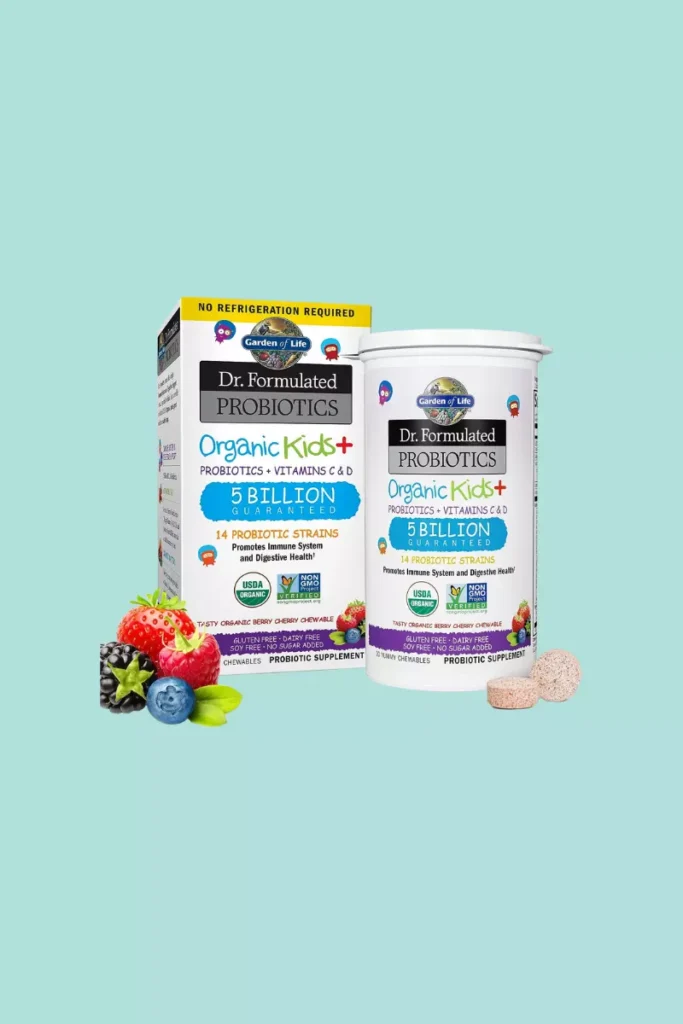
Probiotics for Kids 200 Chewable Tablets 6 Billion CFUs
Probiotics for Kids 200 Chewable Tablets 6 Billion CFUs
- Tablet
- Amazon’s Choice
- 1K+ bought in past month
- 4.5 out of 5 stars 73% 5-star
- Price: $9.99 ($0.05$0.05 / Count)
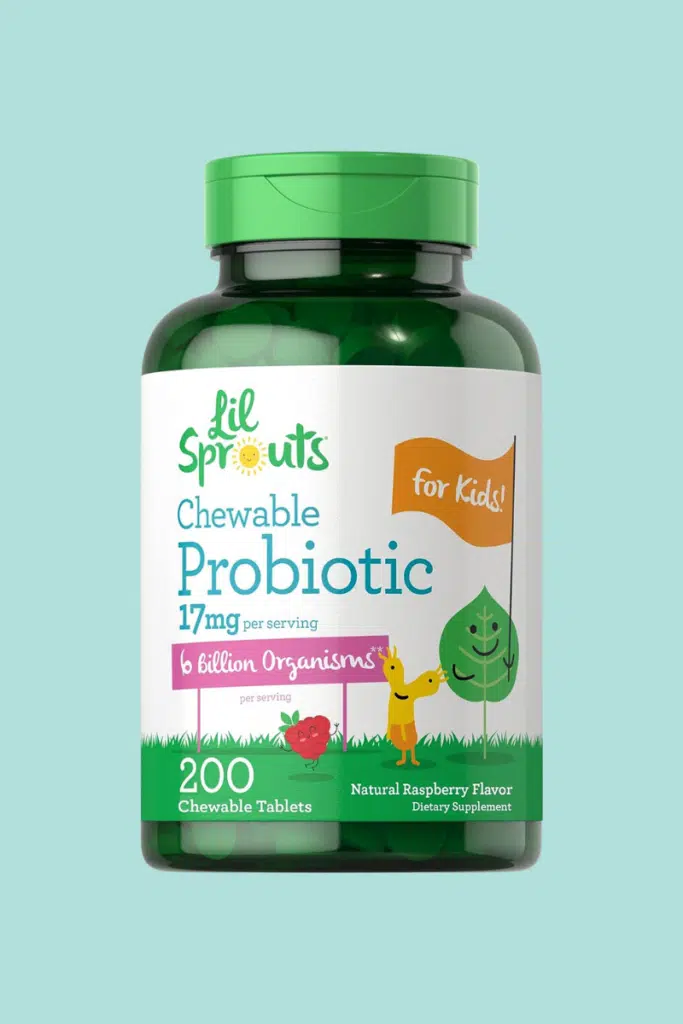
Hyperbiotics Pro Kids
Hyperbiotics Pro Kids
- Small Pearl Shaped Tablet
- 1K+ bought in past month
- 4.4 out of 5 stars 73% 5-star
- Price: $22.79 ($0.38 / Count)
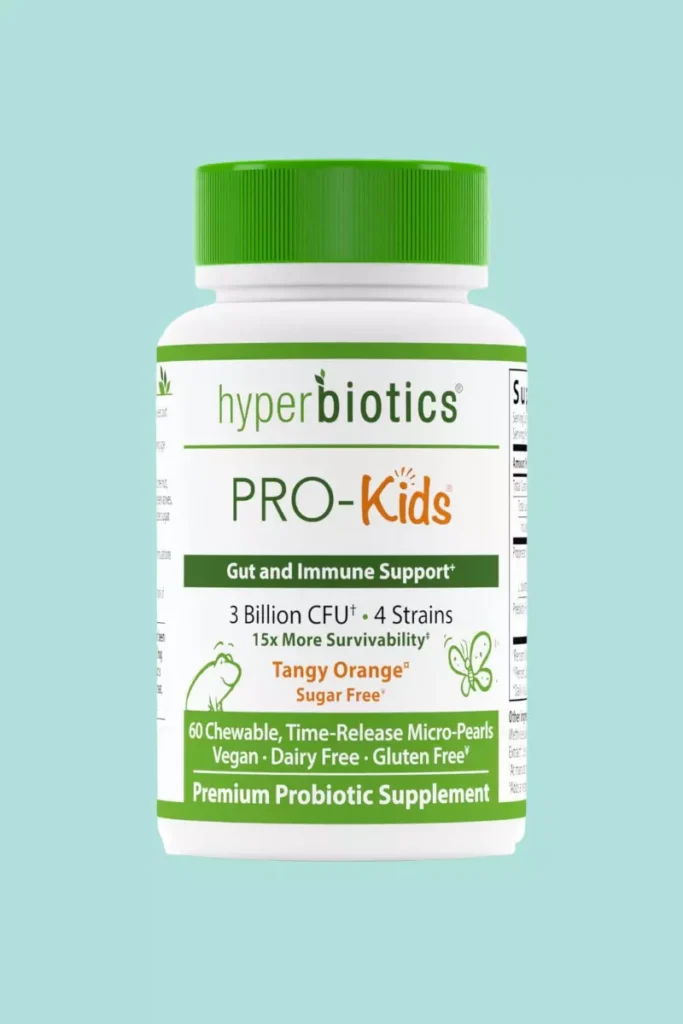
Klaire Labs Ther-Biotic Kids Chewable Probiotic
Klaire Labs Ther-Biotic Kids Chewable Probiotic
- Capsule
- 500+ bought in past month
- 4.5 out of 5 stars 78% 5-star
- Price: $49.99 ($0.83 / Count)
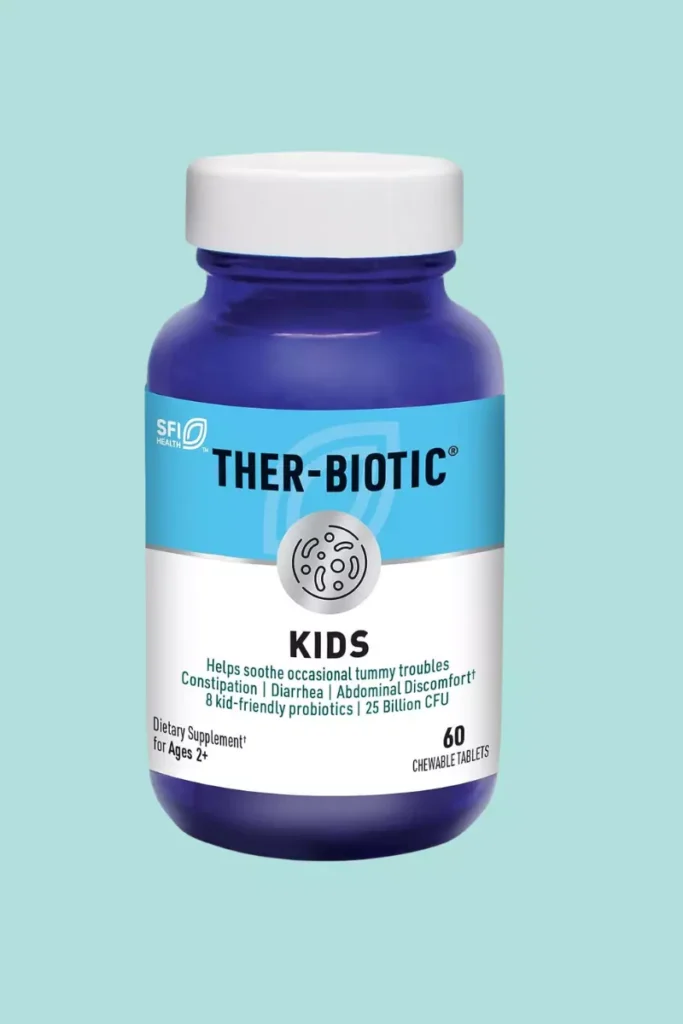
Replenish the Good Kids Vegan Probiotics
Replenish the Good Kids Vegan Probiotics
- Softgel
- 400+ bought in past month
- 4.6 out of 5 stars 75% 5-star
- Price: $17.54 ($0.29 / Count)
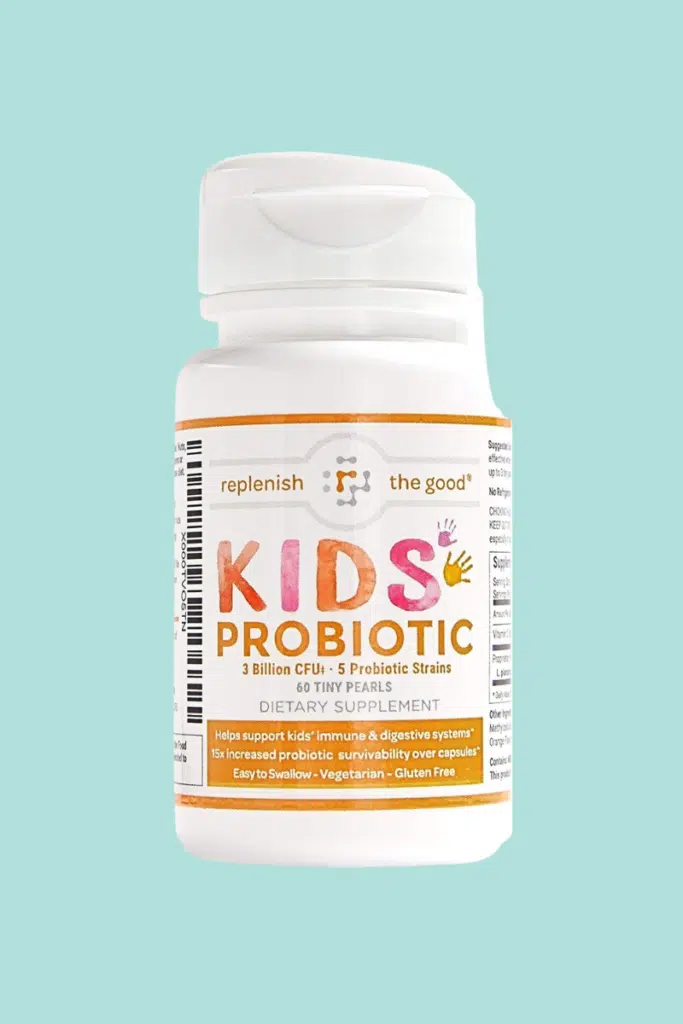
Balance ONE Probiotic for Kids
Balance ONE Probiotic for Kids
- Tablet
- 400+ bought in past month
- 4.5 out of 5 stars 75% 5-star
- Price: $17.07 ($0.28 / Count)
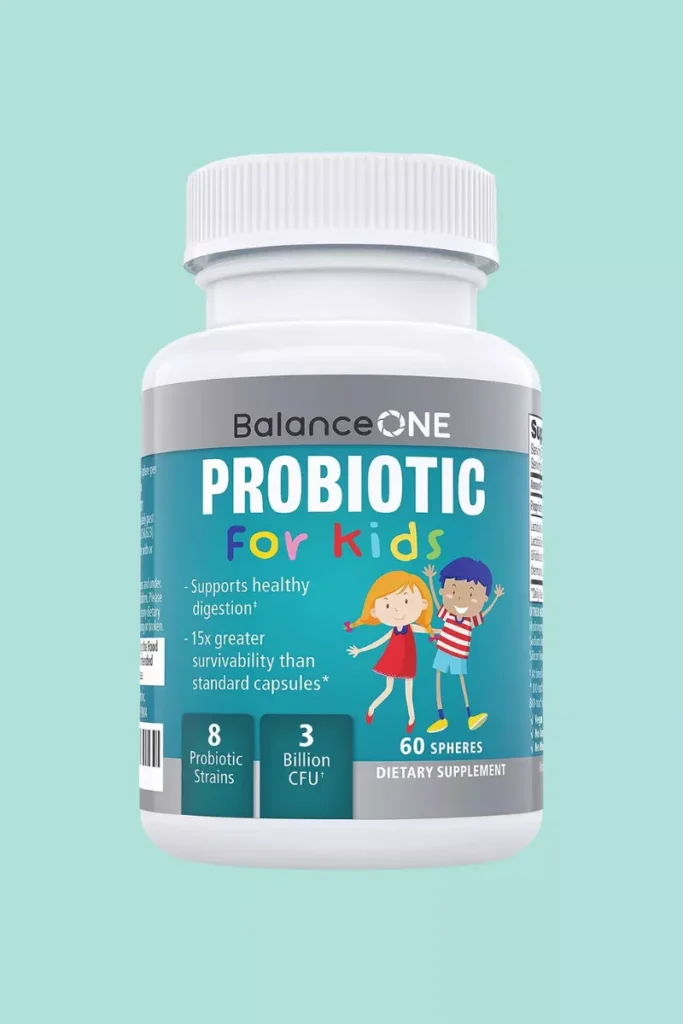
Best Probiotic Drinks for Kids
Here is the list of the best probiotic drinks for kids:
MaryRuth's Cocomelon Toddler Probiotic Liquid Drops for Kids Ages 1-3
MaryRuth’s Cocomelon Toddler Probiotic Liquid Drops
- Liquid
- 1K+ bought in past month
- 4.6 out of 5 stars 82% 5-star
- Price: $19.95 / Fl Oz
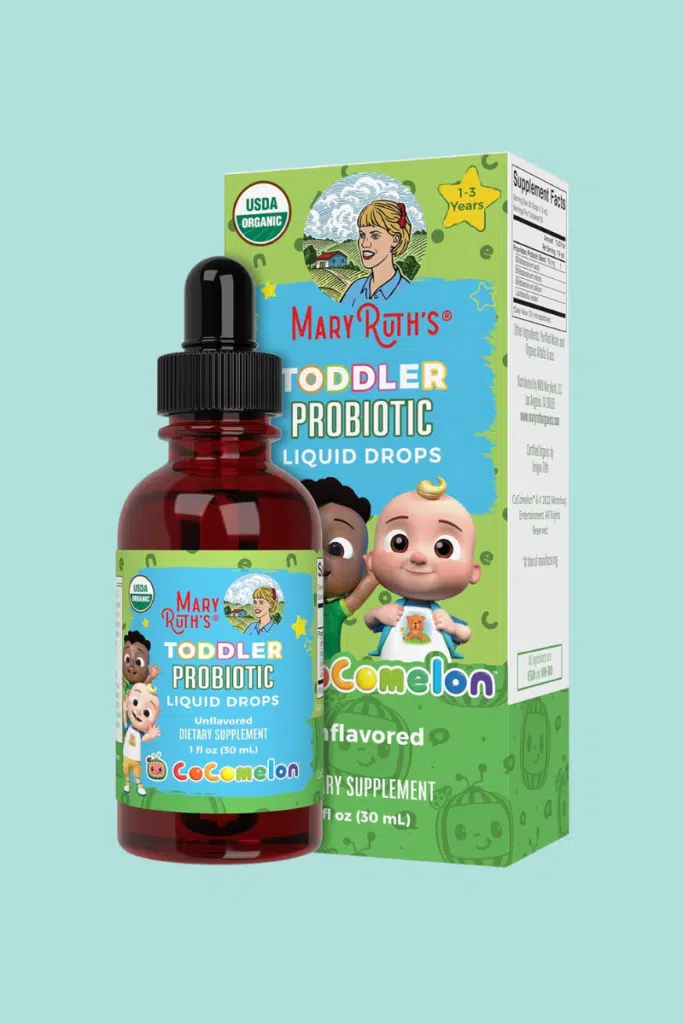
Garden of Life Baby Probiotic Drops Kids
Garden of Life Baby Probiotic Drops Kids
- Liquid
- 1K+ bought in past month
- 4.5 out of 5 stars 74% 5-star
- Price: $18.19 ($9.57 / Fl Oz)
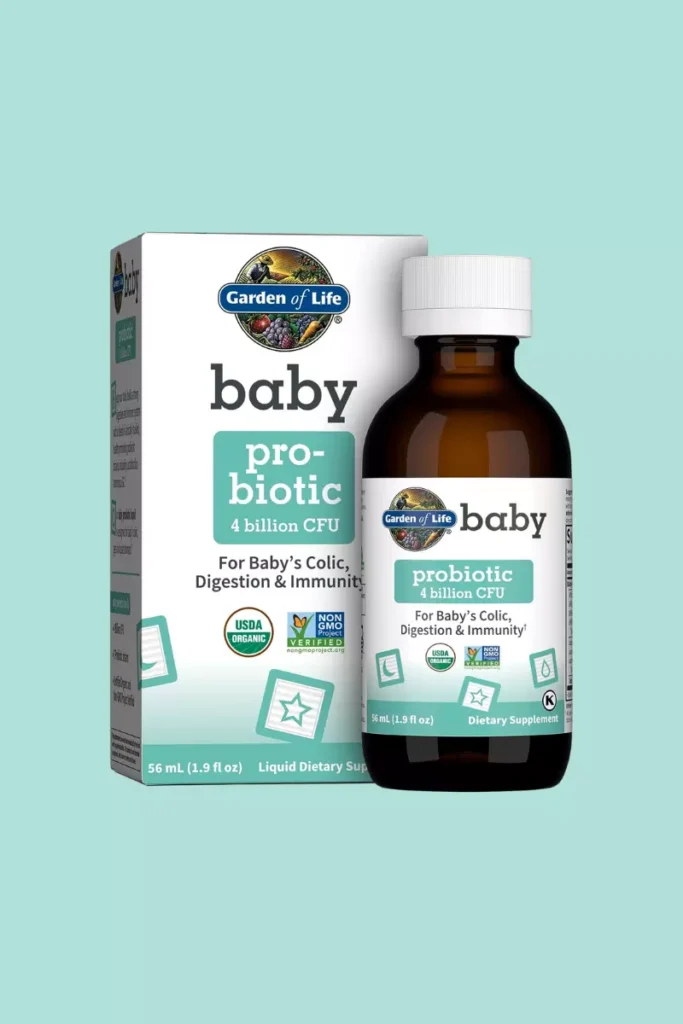
MaryRuth's USDA Organic Liquid Probiotics
MaryRuth’s USDA Organic Liquid Probiotics
- Liquid
- 10K+ bought in past month
- 4.6 out of 5 stars 81% 5-star
- Price: $40.75 ($40.75 / Count)
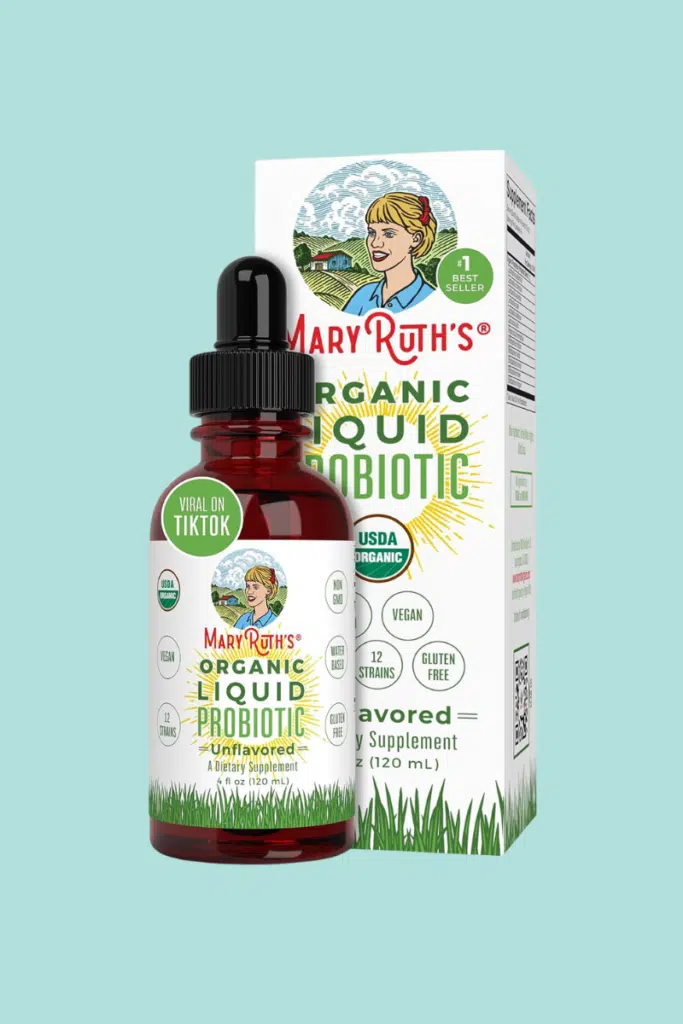
Best Probiotics Powders for Kids
Probiotic powders: best probiotic for kids
Lovebug Award-Winning Probiotics
Lovebug Award-Winning Probiotics
- Powder
- 4K+ bought in past month
- 4.7 out of 5 stars 86% 5-star
- Price: $24.95 ($0.83 / Count)
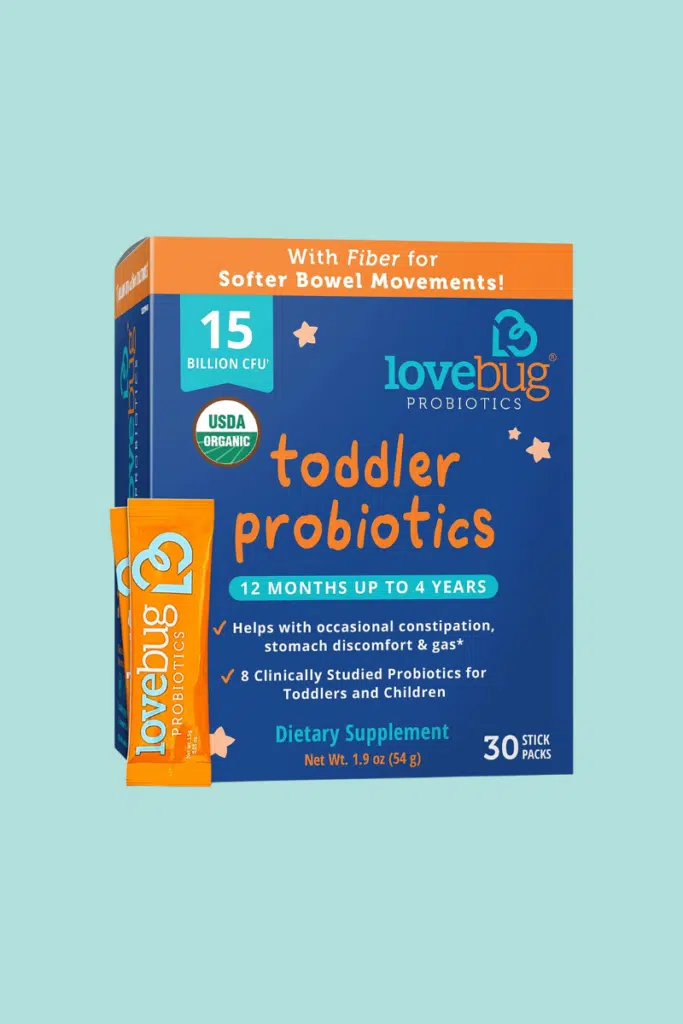
Lovebug Award-Winning USDA Organic Probiotic for Babies
Lovebug Award-Winning USDA Organic Probiotic for Babies
- Powder
- 1K+ bought in past month
- 4.8 out of 5 stars 87% 5-star
- Price: $21.49 ($0.72 / Count)
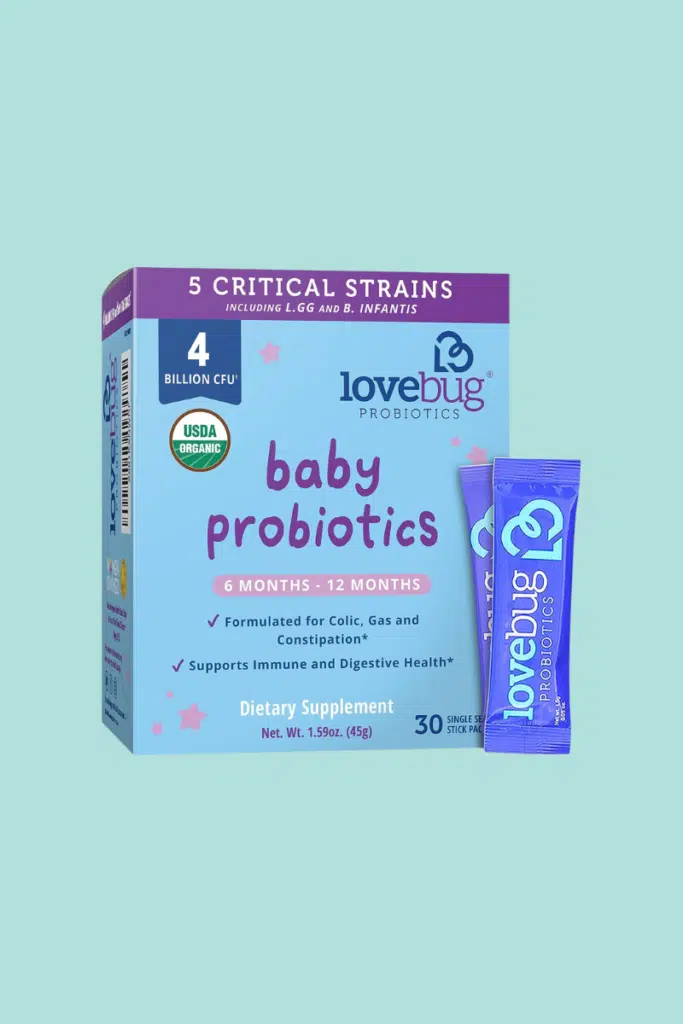
Garden of Life RAW Probiotics Kids
Garden of Life RAW Probiotics Kids
- Powder
- 600+ bought in past month
- 4.6 out of 5 stars 82% 5-star
- Price: $25.14 ($7.39 / Ounce)
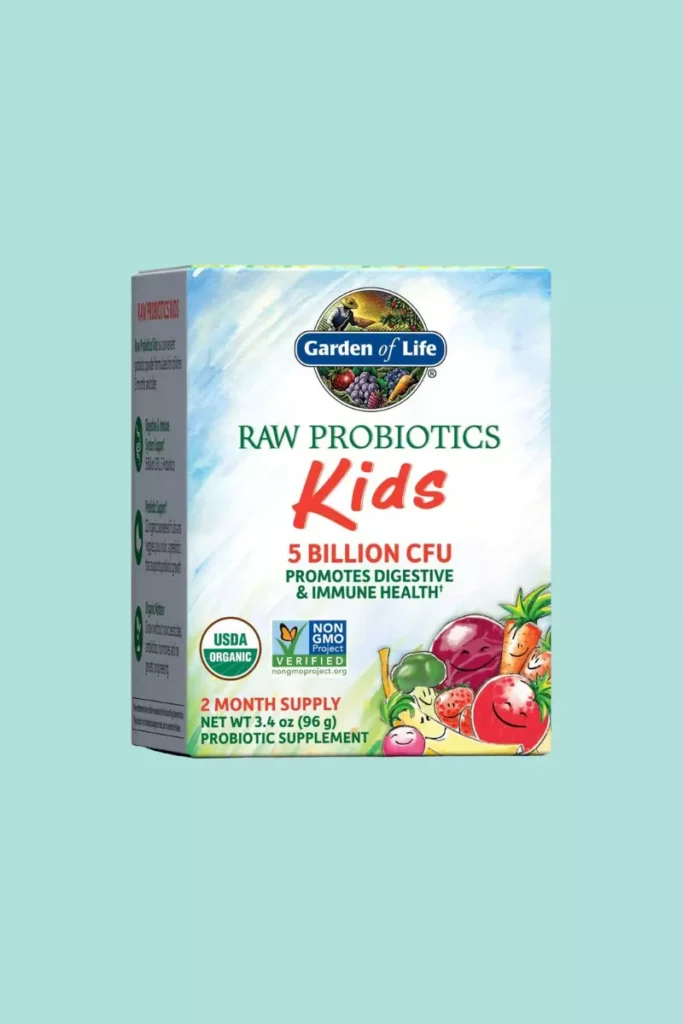
PROVIOTIC Naturally Vegan Bio for Kids
PROVIOTIC Naturally Vegan Bio for Kids
- Powder
- 5.0 out of 5 stars 100% 5-star
- Price: $22.99 ($22.99 / Ounce)
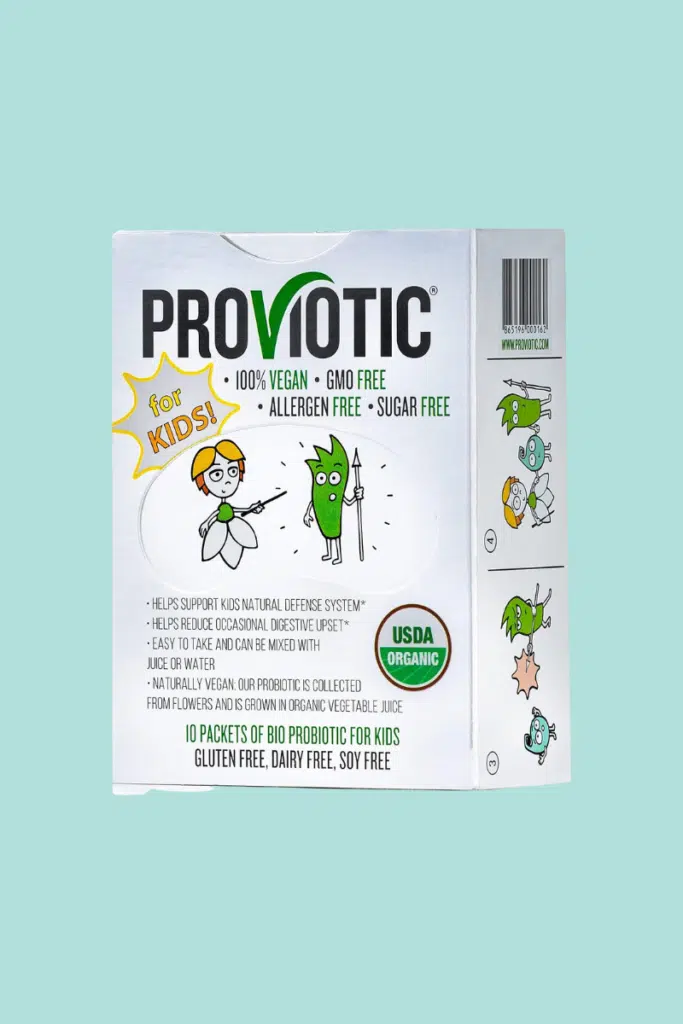
Garden of Life Whole Food Primal Defense HSO Probiotic Formula Kids
Garden of Life Whole Food Primal Defense HSO Probiotic Formula Kids
- Powder
- 200+ bought in past month
- 4.6 out of 5 stars 76% 5-star
- Price: $26.59 ($9.17$9.17 / Ounce)
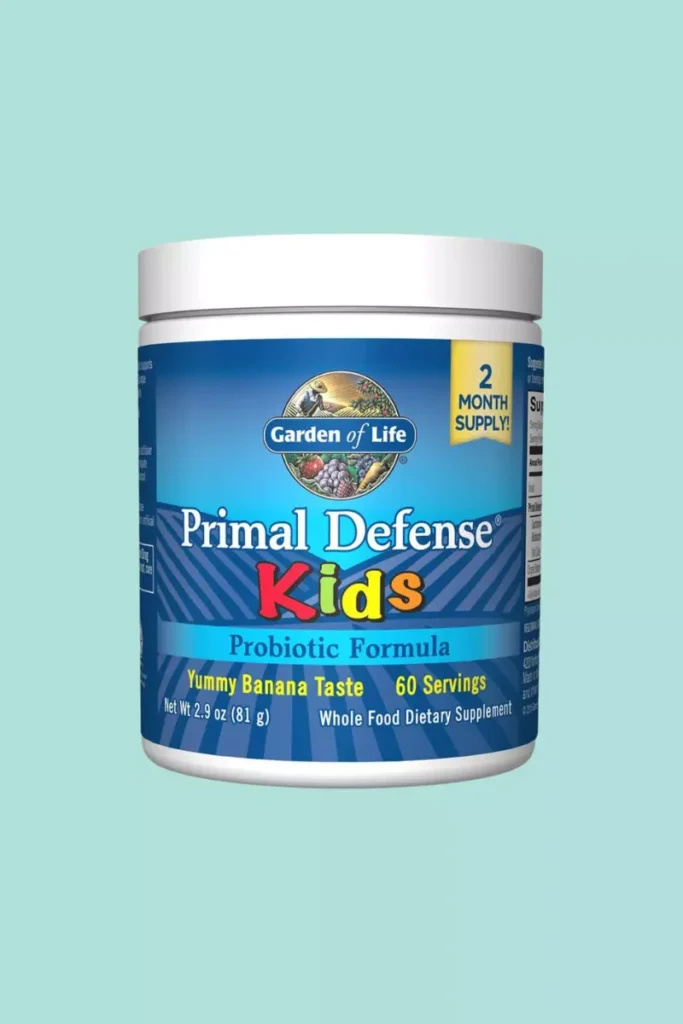
Best Probiotic Gummies for Kids
Here is the list of best probiotics gummies for kids:
MaryRuth's USDA Organic Probiotic Gummy
MaryRuth’s USDA Organic Probiotic Gummy
- Gummy
- 5K+ bought in past month
- 4.8 out of 5 stars 86% 5-star
- Price: $26.96 ($0.45 / Count)
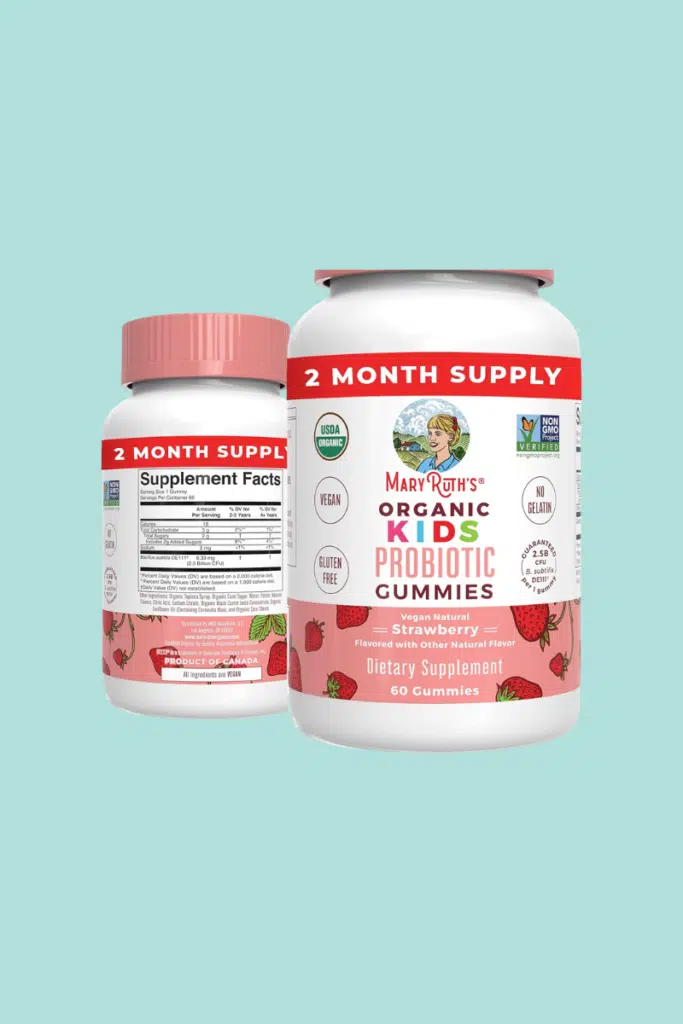
Garden of Life Probiotics for Kids, Cherry Flavor Gummies
Garden of Life Probiotics for Kids, Cherry Flavor Gummies
- Gummy
- 500+ bought in past month
- 4.7 out of 5 stars 79% 5-star
- Price: $21.27 ($0.71 / Count)
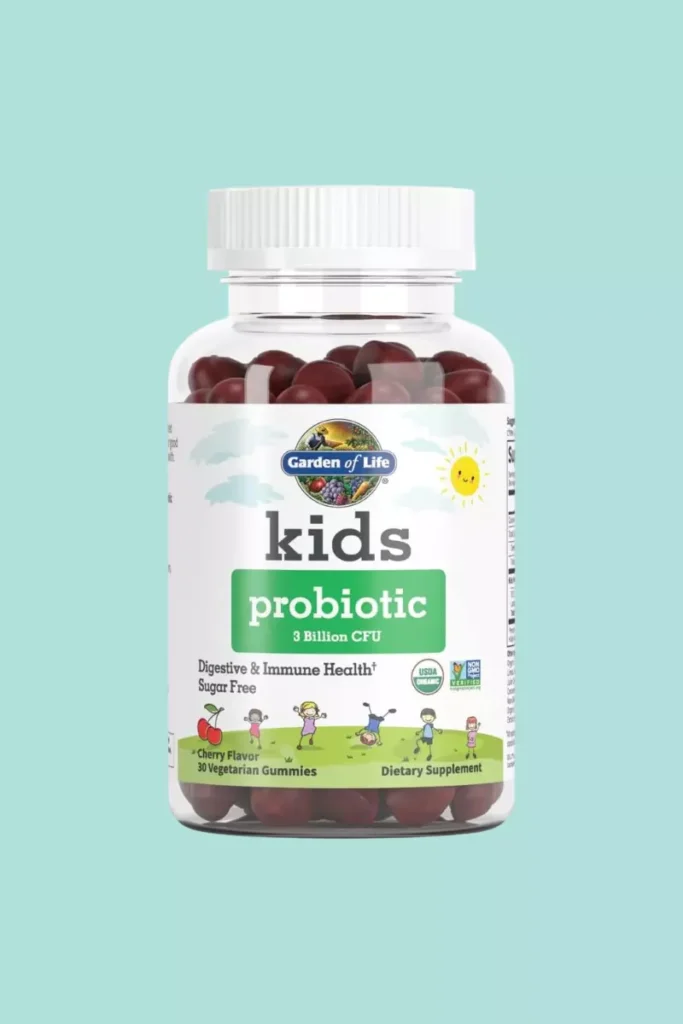
Llama Naturals Real Fruit Prebiotic & Probiotic Kids Gummies
Llama Naturals Real Fruit Prebiotic & Probiotic Kids Gummies
- Real Fruit Gummies
- 1K+ bought in past month
- 4.4 out of 5 stars72% 5-star
- Price: $22.46 ($0.37 / Count)
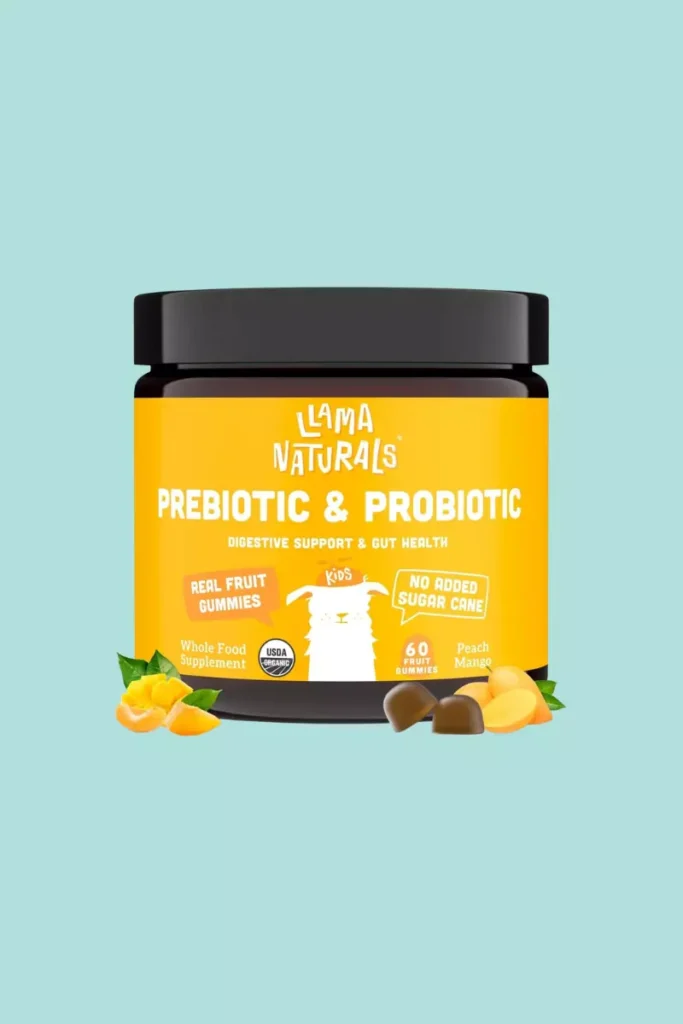
Lovebug Award-Winning USDA Organic Probiotic Gummies for Kids
Lovebug Award-Winning USDA Organic Probiotic Gummies
- Gummies
- 200+ bought in past month
- 4.7 out of 5 stars 86% 5-star
- Price: $18.95 ($0.63$0.63 / Count)
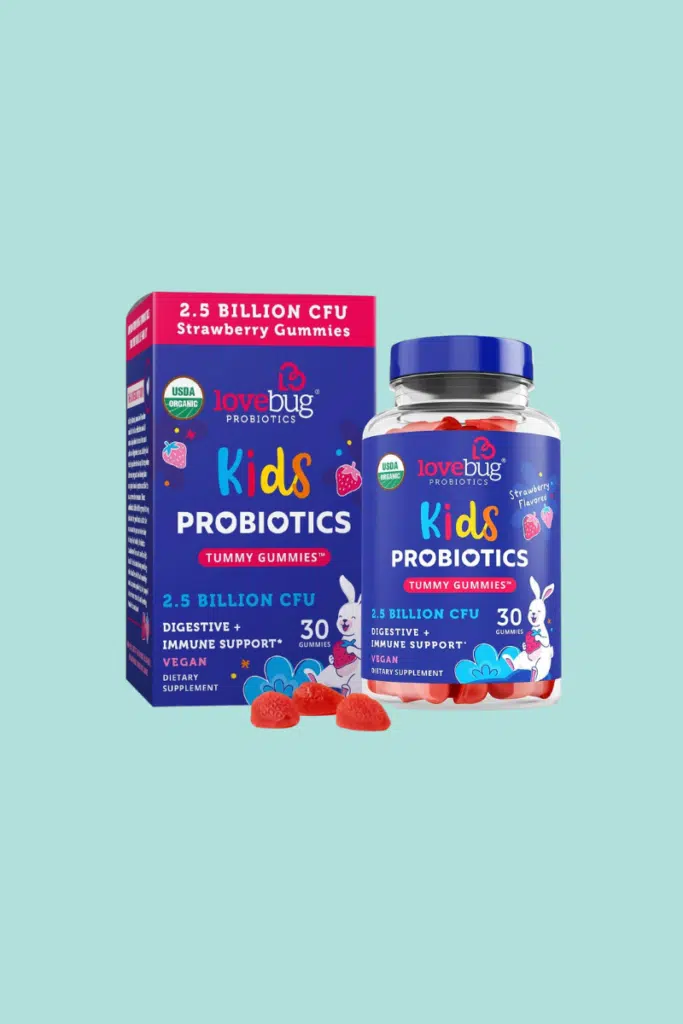
Plant. O Organic Probiotic Gummies for Kids
Plant. O Organic Probiotic Gummies for Kids
- Gummies
- 100+ bought in past month
- 4.8 out of 5 stars 85% 5-star
- Price: $13.47 ($0.45 / Count)
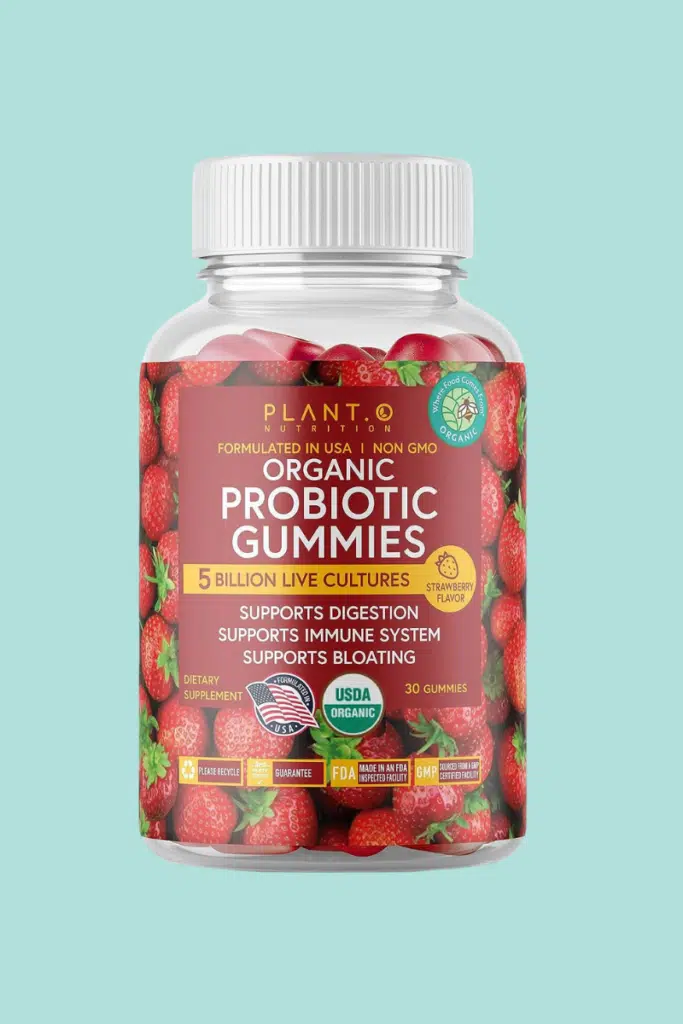
Ancient Nutrition Probiotics for Kids, Kids Probiotics Gummies
Ancient Nutrition Probiotics for Kids, Kids Probiotics Gummies
- Gummies
- 50+ bought in past month
- 5.0 out of 5 stars 100% 5-star
- Price: $19.95 ($19.95$19.95 / Count)
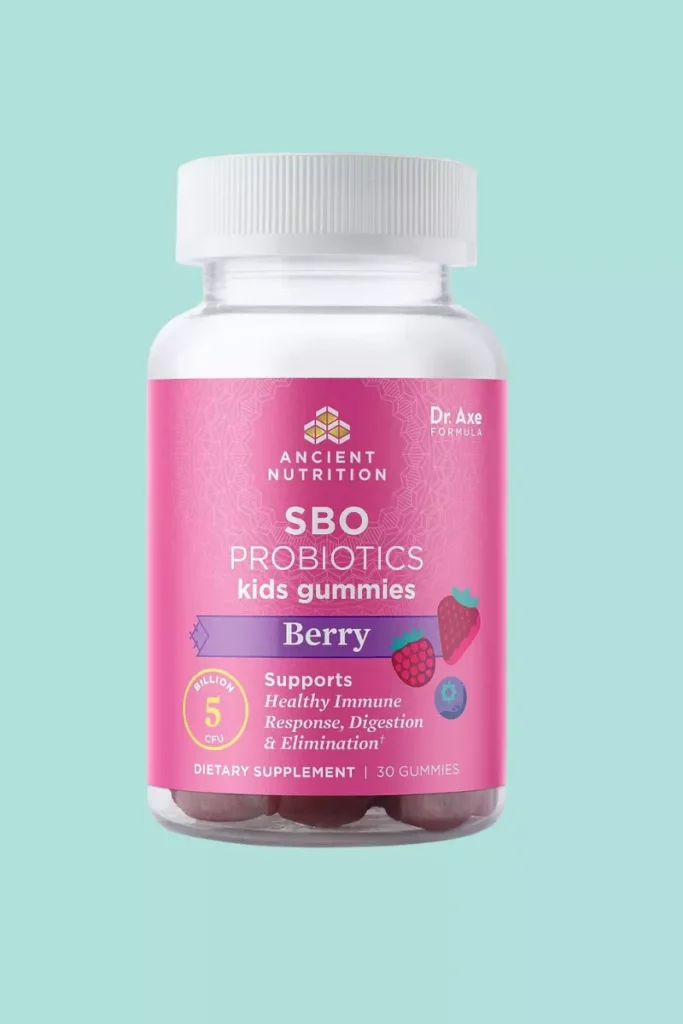
Frequently Asked Questions
Are Probiotics Safe for Kids?
Is it good for kids to take probiotics daily?
Does my child need a prebiotic or a probiotic?
What are some good kids' probiotics?
Garden of Life Dr. Formulated Probiotics Organic Kids+
Garden of Life Baby Probiotic Drops Kids
Hyperbiotics PRO-Kids Children's Probiotics
MaryRuth’s USDA Organic Liquid Probiotics
MaryRuth’s USDA Organic Probiotic Gummy
Klaire Labs Ther-Biotic Kids Chewable Probiotic
Probiotics for Kids 200 Chewable Tablets 6 Billion CFUs
It is important to consult with a pediatrician before giving any new supplements to children.
Should my child take a probiotic?
References
- Blanton, Laura V., et al. “Gut Bacteria That Prevent Growth Impairments Transmitted by Microbiota from Malnourished Children.” Science (New York, N.Y.), vol. 351, no. 6275, Feb. 2016, p. 10.1126/science.aad3311 aad3311, https://doi.org/10.1126/science.aad3311.
- Koskenniemi, Kerttu, et al. “Proteomics and Transcriptomics Characterization of Bile Stress Response in Probiotic Lactobacillus Rhamnosus GG *.” Molecular & Cellular Proteomics, vol. 10, no. 2, Feb. 2011, pp. S1–18, https://doi.org/10.1074/mcp.M110.002741.
- Preidis, Geoffrey A., et al. “AGA Technical Review on the Role of Probiotics in the Management of Gastrointestinal Disorders.” Gastroenterology, vol. 159, no. 2, Aug. 2020, pp. 708-738.e4, https://doi.org/10.1053/j.gastro.2020.05.060.
Review date not set.
How we reviewed this article:
Latest on:





